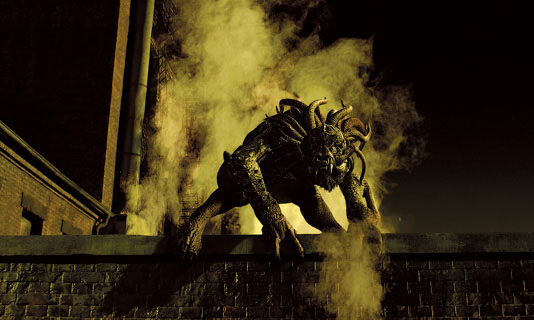“Tippett Studio Muscle Systemand Skin Solver “Hellboy”” by Toro
Title:
- Tippett Studio Muscle Systemand Skin Solver “Hellboy”
Conference:
SIGGRAPH Video Review:
Length:
- 2:27
Director(s):
Company / Institution / Agency:
- Tippett Studio
Description:
Tippett Studio visual effects supervisor Blair Clark rejoins directorGuillermo del Toro in creating the creatures and environments for the Revolution Studios movie, “Hellboy.” Clark and his team con-tributed five CG characters in 15 sequences comprising 132 shots,in numerous day-and-night and wet-and-dry environments. Usinghand-key-framed animation, the entire work exhibits a step forward in seamless visual effects. To add another level of photo realism,and to fully realize the fantastic characters of “Hellboy,” TippettStudio utilized a new, proprietary “muscle system and skin solver”developed by CG supervisor William Todd Stinson and character set-up lead Paul G. Thuriot. The muscle system stretches, contracts,and even adds tension, all to maintain a consistent volume of underlying anatomical geometry. On top of this, the skin stretches and slides in response to the motion of the character’s internal structure.
Hardware:
HARDWARE: PC, Apple, SGI single CPU, average 2 GB RAM. Rendering Farm:
CPU numbers N.A. Graphics card: NVIDIA.
Software:
SOFTWARE DEVELOPER: Modeling, animation, and dynamics: Maya. Rendering: RenderMan.
Compositing: Shake. Custom software: custom plug-ins. The muscle
system, a Maya plug-in, creates muscle surfaces that expand and
contract while deforming to preserve the initial volume. The skin
system, a Maya plug-in, builds a renderable surface that is deformed
in response to the motion of the character’s internal anatomy. As
the puppet moves (which, in turn, affects the intermediate layers),
the skin stretches and slides over these underlying surfaces. Also
custom PrMan shaders, and RIB and RIB Archive generation tools.
OS: various.
Additional Contributors:
Producers: Lawrence Gordon, Lloyd Levin, Mike Richardson
Production Visual Effects Producer: Edward Irastorza
Visual Effects Supervisor: Blair Clark
Visual Effects Producer: Alexandra de Souza
Visual Effects Art Director: Joel Friesch
Animation Supervisor: Todd Labonte
CG Supervisor: William Todd Stinson
VFX Production Manager: Tim de Pala
Animators: Simon Allen, Jason Armstrong, Dovi Anderson, Michael Brunet, Chuck Duke, Will Elder-Groebe, Aaron “Giggleman” Gilman, Traci Horie, Eric Ingerson, Julie Jaros, Michael Kitchen, Brian Mendenhall, Morgan Ratsoy
Lead Lighters: Kirsten Drummond, Steve Redding
Lighters: Jim Aupperle, Aharon Bourland, Conrad Chu, Jeff A. Johnson, Kevin McGowan, Charles Rose, Julien Schreyer, Bart Trickel, Davy Wentworth
Lead Compositors: Colin Epstein, Jim McVay
Compositors: Dan Cayer, Chris Gibbons, Aruna Inversin, Matt Jacobs, Zoe Peck-Eyler, Gerard Benjamin Pierre, Matthew Wallin
Lead FX Animator: Demetrius Sabina Leal
FX Animators: Nathaniel Hunter, Clear Menser, Ralph Sevazlian
Junior FX Animators: Uma Havaligi, Ariel Tal
Lead Character Set-Up: Paul G. Thuriot
Character Set-Up: Joe Harkins, Peter Newsome
Lead CG Painters: Laura Hainke, Raine Reen
CG Painters: Renee Binkowski, Ruth Caspary, Edward Quintero, Sara Simon
Lead CG Modeler: Sven Jensen
CG Modelers: Dylan Gottlieb, Ease Owyeung, Jeff Unay, Robert Vignone
Lead Match-Move: Kirk Larkins, Christopher Paizis
Match-Move: Devin Breese, Tyler Ham, Dong Yon Kang, Stephen Moros, David Petry
Lead Roto/Paint: Rick Markle
Roto/Paint: Misty Segura Barbour, Shelley Campbell, Lucinda Chee, Robert Dorris, Ramona Martinez
VFX Coordinators: Genevieve Proctor McMahon, Naomi Ruth Raine
Production Assistant: Veronica D. Savage
VFX Editor: Sarah Schubart
VFX Editorial Assistants: Salvatore Catanzaro, Thomas Krebbs
Digital Imaging Supervisor: Matthew Tomlinson
Film I/O Supervisor: Nathan Abbot
Digital Film I/O Manager: Vicki Wong
Digital Color Corrector: Adam Gerardin
Production Programmer: Russell Darling
Systems Support: Neal Hoover, M. Stevens
Data Wrangler: Deborah Thomas
Executive Producers: Jules Roman, Alonzo Ruvalcaba
Additional Information:
PRODUCTION
Modeling: surfacing and standard polygonal modeling for primary rendering surfaces; proprietary techniques based on naturalistic anatomy for internal muscle surfaces. Some 2D rotoscoping used.Rendering technique used most: RenderMan. Average renderingCPU time per frame: varied. Total production time: approximately15 months. Production highlight: Developed a proprietary muscle system and skin solver.





